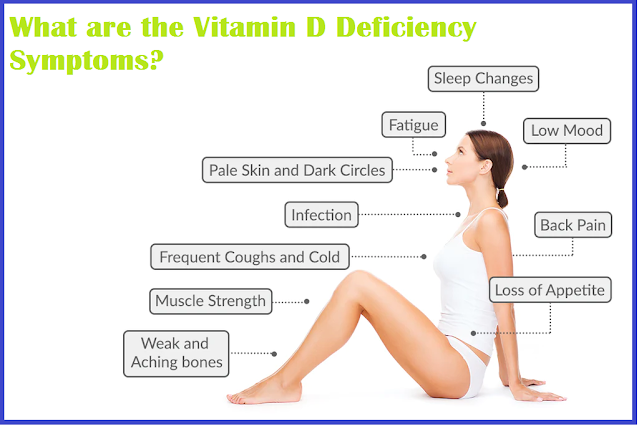Description
Explore the vital information about Vitamin D deficiency symptoms in this comprehensive guide. Learn to recognize the signs and protect your health with expert insights.
👇👇
What are the Vitamin D Deficiency Symptoms?
Vitamin D, often referred to as the "sunshine vitamin," plays a crucial role in our overall health. However, many people are unaware of the potential harm that Vitamin D deficiency can cause. In this article, we'll explore the various symptoms of Vitamin D deficiency, empowering you to recognize and address this common issue.
Introduction
Vitamin D is essential for the proper functioning of our body. It helps in maintaining strong bones, supporting the immune system, and regulating mood. However, despite its significance, a deficiency in Vitamin D is more common than you might think. Understanding the symptoms is the first step toward ensuring your health and well-being.
Fatigue and Weakness
One of the initial signs of a Vitamin D deficiency is a persistent feeling of fatigue and weakness. You might find yourself tired even after a good night's sleep and lacking the energy to perform everyday tasks.
Bone Pain
Vitamin D plays a key role in calcium absorption. A deficiency can lead to softening of the bones, resulting in bone pain, muscle weakness, and sometimes, more severe conditions like osteoporosis.
Muscle Aches
Vitamin D deficiency is often associated with muscle aches and general muscle weakness. This can affect your mobility and overall comfort.
Mood Changes
Vitamin D is known to influence mood and brain function. A deficiency can lead to mood changes, including depression and a general feeling of sadness.
Impaired Wound Healing
Vitamin D is essential for the body's ability to repair itself. A deficiency can slow down the healing process of wounds and injuries.
Hair Loss
While hair loss can have various causes, some studies suggest that a lack of Vitamin D may contribute to hair thinning and loss.
Frequent Illnesses
A weakened immune system is a common result of Vitamin D deficiency, making you more susceptible to illnesses and infections.
FAQ
Q: Can I get enough Vitamin D from sunlight alone?
A: Sunlight is a natural source of Vitamin D, but it may not be sufficient for everyone, depending on factors like geographical location and skin tone.
Q: What are good dietary sources of Vitamin D?
A: Fatty fish, fortified dairy products, and supplements are excellent sources of Vitamin D.
Q: How is a Vitamin D deficiency diagnosed?
A: A blood test is typically used to diagnose a deficiency in Vitamin D.
Q: What is the recommended daily intake of Vitamin D?
A: The recommended intake varies by age and gender. Generally, adults need around 600-800 IU (15-20 mcg) per day.
Q: Can Vitamin D supplements help with deficiency symptoms?
A: Yes, supplements are often recommended to address Vitamin D deficiency.
Q: How long does it take to correct a Vitamin D deficiency?
A: The time it takes to correct a deficiency depends on its severity and the treatment approach. It may take a few weeks to several months.
Conclusion
Recognizing the symptoms of Vitamin D deficiency is crucial for maintaining your overall health and well-being. If you suspect you may have a deficiency, it's essential to consult a healthcare professional for proper diagnosis and treatment. Ensuring you get an adequate amount of Vitamin D through sunlight, diet, or supplements can help prevent deficiency and its associated symptoms.

